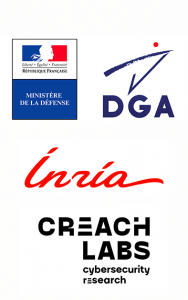| In collaboration with |
Information systems and networks have become indispensable aids in our everyday lives. In addition to highly visible uses as mobile phones or personal computers, it is worth mentioning applications more subtle but equally important for economic activity such as cloud computing, industrial control systems, electrical networks. In fact, our society nurtures a growing dependence towards information systems which makes economic and sovereignty issues related to security increasingly important.
At the same time, due to their increasing complexity, their ubiquity, and multiplicity of risks associated with malicious or fraudulent use, ensuring an acceptable level of security seems close to impossible. Many questions related to the control of the security of softwares and information systems are thus at the origin of an intense scientific activity. We can cite for example intrusion detection, vulnerability research, proof of protocols, static analysis, virtualization…
From the interaction of all these themes, emerges a deep scientific domain that forms a point of contact between fundamental research and applications with a strong economic potential. Rennes metropolitan area is home to many talents in this field of research, both in academia and industry. This seminar aims to become a natural platform to gather, stimulate and promote Rennes security research and development community by confronting it to the best achievements of international research.
Scientific board
The scientific board is in charge of the organization and the program of the seminar.
Its members are:
• Tristan Allard (Université de Rennes)
• Guillaume Doyen (IMT Atlantique)
• Teddy Furon (Inria)
• Guillaume Hiet (CentraleSupélec)
• Joseph Lallemand (CNRS)
• David Lubicz (DGA-MI)
• Louis Rilling (DGA-MI)
• Mohamed Sabt (Université de Rennes)
• Sandrine Turgis (Université de Rennes)
Since the audience of this seminar may have various backgrounds, it is advisable that the speaker takes time to motivate his work and explain it in the clearest language possible.
When the scientific board deems it relevant, several talks on similar subjects may be grouped together, to get different approaches of a same domain in one half-day.



